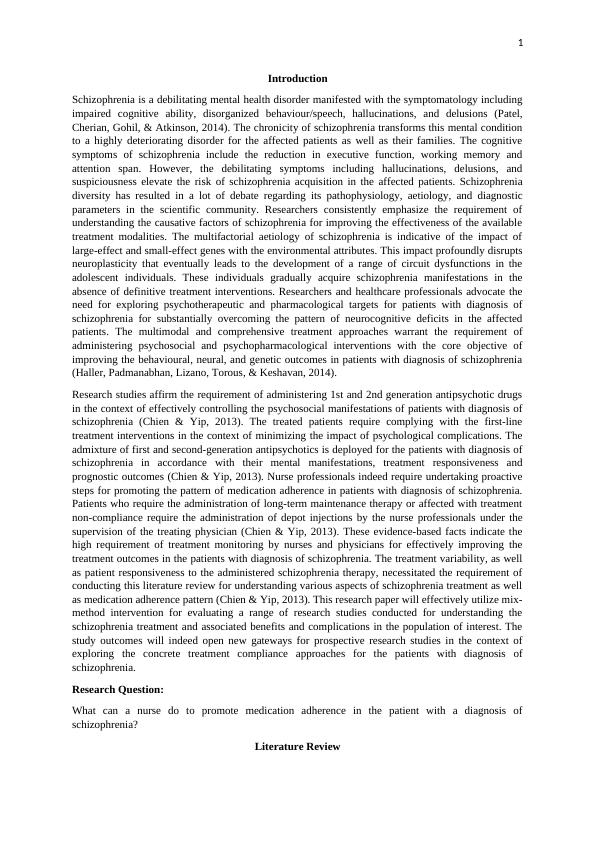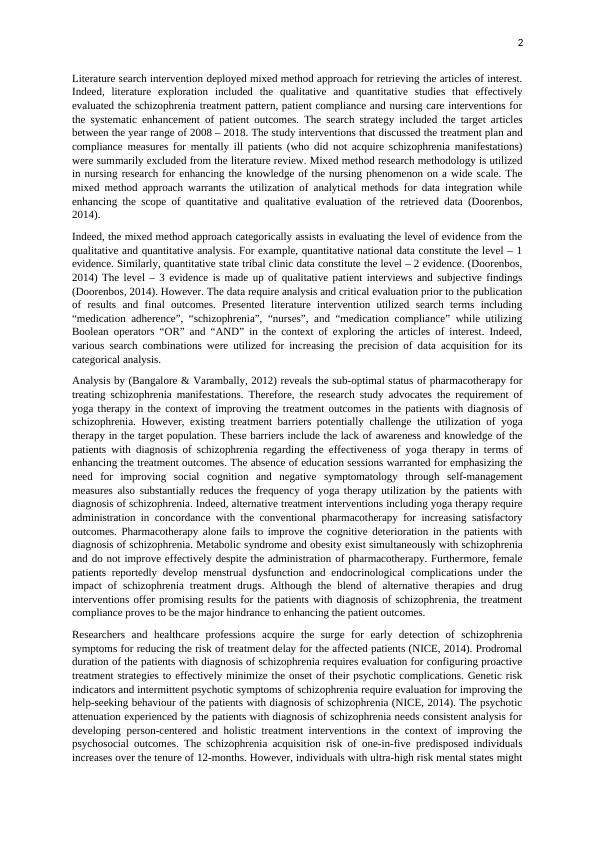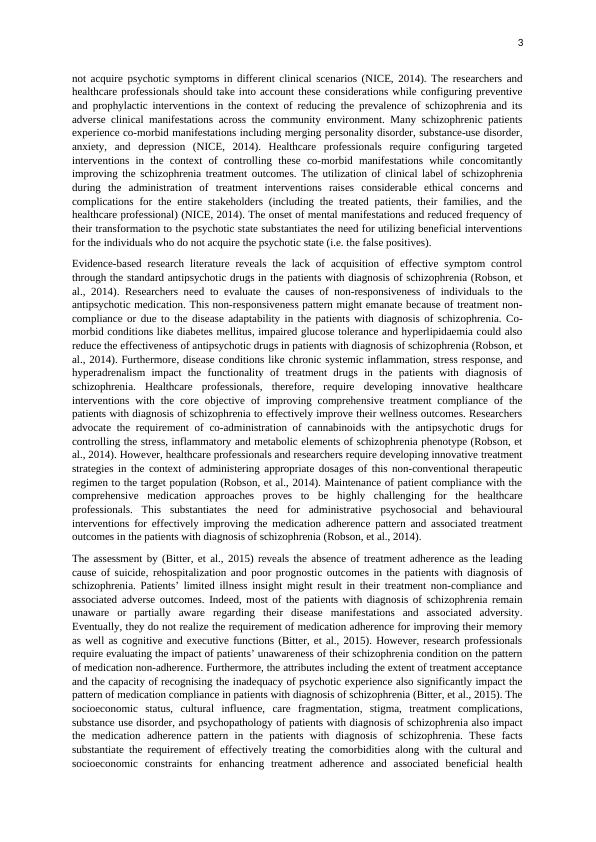Promoting Medication Adherence in Patients with Schizophrenia: A Literature Review
Added on 2023-06-14
16 Pages9106 Words319 Views

1
Introduction
Schizophrenia is a debilitating mental health disorder manifested with the symptomatology including
impaired cognitive ability, disorganized behaviour/speech, hallucinations, and delusions (Patel,
Cherian, Gohil, & Atkinson, 2014). The chronicity of schizophrenia transforms this mental condition
to a highly deteriorating disorder for the affected patients as well as their families. The cognitive
symptoms of schizophrenia include the reduction in executive function, working memory and
attention span. However, the debilitating symptoms including hallucinations, delusions, and
suspiciousness elevate the risk of schizophrenia acquisition in the affected patients. Schizophrenia
diversity has resulted in a lot of debate regarding its pathophysiology, aetiology, and diagnostic
parameters in the scientific community. Researchers consistently emphasize the requirement of
understanding the causative factors of schizophrenia for improving the effectiveness of the available
treatment modalities. The multifactorial aetiology of schizophrenia is indicative of the impact of
large-effect and small-effect genes with the environmental attributes. This impact profoundly disrupts
neuroplasticity that eventually leads to the development of a range of circuit dysfunctions in the
adolescent individuals. These individuals gradually acquire schizophrenia manifestations in the
absence of definitive treatment interventions. Researchers and healthcare professionals advocate the
need for exploring psychotherapeutic and pharmacological targets for patients with diagnosis of
schizophrenia for substantially overcoming the pattern of neurocognitive deficits in the affected
patients. The multimodal and comprehensive treatment approaches warrant the requirement of
administering psychosocial and psychopharmacological interventions with the core objective of
improving the behavioural, neural, and genetic outcomes in patients with diagnosis of schizophrenia
(Haller, Padmanabhan, Lizano, Torous, & Keshavan, 2014).
Research studies affirm the requirement of administering 1st and 2nd generation antipsychotic drugs
in the context of effectively controlling the psychosocial manifestations of patients with diagnosis of
schizophrenia (Chien & Yip, 2013). The treated patients require complying with the first-line
treatment interventions in the context of minimizing the impact of psychological complications. The
admixture of first and second-generation antipsychotics is deployed for the patients with diagnosis of
schizophrenia in accordance with their mental manifestations, treatment responsiveness and
prognostic outcomes (Chien & Yip, 2013). Nurse professionals indeed require undertaking proactive
steps for promoting the pattern of medication adherence in patients with diagnosis of schizophrenia.
Patients who require the administration of long-term maintenance therapy or affected with treatment
non-compliance require the administration of depot injections by the nurse professionals under the
supervision of the treating physician (Chien & Yip, 2013). These evidence-based facts indicate the
high requirement of treatment monitoring by nurses and physicians for effectively improving the
treatment outcomes in the patients with diagnosis of schizophrenia. The treatment variability, as well
as patient responsiveness to the administered schizophrenia therapy, necessitated the requirement of
conducting this literature review for understanding various aspects of schizophrenia treatment as well
as medication adherence pattern (Chien & Yip, 2013). This research paper will effectively utilize mix-
method intervention for evaluating a range of research studies conducted for understanding the
schizophrenia treatment and associated benefits and complications in the population of interest. The
study outcomes will indeed open new gateways for prospective research studies in the context of
exploring the concrete treatment compliance approaches for the patients with diagnosis of
schizophrenia.
Research Question:
What can a nurse do to promote medication adherence in the patient with a diagnosis of
schizophrenia?
Literature Review
Introduction
Schizophrenia is a debilitating mental health disorder manifested with the symptomatology including
impaired cognitive ability, disorganized behaviour/speech, hallucinations, and delusions (Patel,
Cherian, Gohil, & Atkinson, 2014). The chronicity of schizophrenia transforms this mental condition
to a highly deteriorating disorder for the affected patients as well as their families. The cognitive
symptoms of schizophrenia include the reduction in executive function, working memory and
attention span. However, the debilitating symptoms including hallucinations, delusions, and
suspiciousness elevate the risk of schizophrenia acquisition in the affected patients. Schizophrenia
diversity has resulted in a lot of debate regarding its pathophysiology, aetiology, and diagnostic
parameters in the scientific community. Researchers consistently emphasize the requirement of
understanding the causative factors of schizophrenia for improving the effectiveness of the available
treatment modalities. The multifactorial aetiology of schizophrenia is indicative of the impact of
large-effect and small-effect genes with the environmental attributes. This impact profoundly disrupts
neuroplasticity that eventually leads to the development of a range of circuit dysfunctions in the
adolescent individuals. These individuals gradually acquire schizophrenia manifestations in the
absence of definitive treatment interventions. Researchers and healthcare professionals advocate the
need for exploring psychotherapeutic and pharmacological targets for patients with diagnosis of
schizophrenia for substantially overcoming the pattern of neurocognitive deficits in the affected
patients. The multimodal and comprehensive treatment approaches warrant the requirement of
administering psychosocial and psychopharmacological interventions with the core objective of
improving the behavioural, neural, and genetic outcomes in patients with diagnosis of schizophrenia
(Haller, Padmanabhan, Lizano, Torous, & Keshavan, 2014).
Research studies affirm the requirement of administering 1st and 2nd generation antipsychotic drugs
in the context of effectively controlling the psychosocial manifestations of patients with diagnosis of
schizophrenia (Chien & Yip, 2013). The treated patients require complying with the first-line
treatment interventions in the context of minimizing the impact of psychological complications. The
admixture of first and second-generation antipsychotics is deployed for the patients with diagnosis of
schizophrenia in accordance with their mental manifestations, treatment responsiveness and
prognostic outcomes (Chien & Yip, 2013). Nurse professionals indeed require undertaking proactive
steps for promoting the pattern of medication adherence in patients with diagnosis of schizophrenia.
Patients who require the administration of long-term maintenance therapy or affected with treatment
non-compliance require the administration of depot injections by the nurse professionals under the
supervision of the treating physician (Chien & Yip, 2013). These evidence-based facts indicate the
high requirement of treatment monitoring by nurses and physicians for effectively improving the
treatment outcomes in the patients with diagnosis of schizophrenia. The treatment variability, as well
as patient responsiveness to the administered schizophrenia therapy, necessitated the requirement of
conducting this literature review for understanding various aspects of schizophrenia treatment as well
as medication adherence pattern (Chien & Yip, 2013). This research paper will effectively utilize mix-
method intervention for evaluating a range of research studies conducted for understanding the
schizophrenia treatment and associated benefits and complications in the population of interest. The
study outcomes will indeed open new gateways for prospective research studies in the context of
exploring the concrete treatment compliance approaches for the patients with diagnosis of
schizophrenia.
Research Question:
What can a nurse do to promote medication adherence in the patient with a diagnosis of
schizophrenia?
Literature Review

2
Literature search intervention deployed mixed method approach for retrieving the articles of interest.
Indeed, literature exploration included the qualitative and quantitative studies that effectively
evaluated the schizophrenia treatment pattern, patient compliance and nursing care interventions for
the systematic enhancement of patient outcomes. The search strategy included the target articles
between the year range of 2008 – 2018. The study interventions that discussed the treatment plan and
compliance measures for mentally ill patients (who did not acquire schizophrenia manifestations)
were summarily excluded from the literature review. Mixed method research methodology is utilized
in nursing research for enhancing the knowledge of the nursing phenomenon on a wide scale. The
mixed method approach warrants the utilization of analytical methods for data integration while
enhancing the scope of quantitative and qualitative evaluation of the retrieved data (Doorenbos,
2014).
Indeed, the mixed method approach categorically assists in evaluating the level of evidence from the
qualitative and quantitative analysis. For example, quantitative national data constitute the level – 1
evidence. Similarly, quantitative state tribal clinic data constitute the level – 2 evidence. (Doorenbos,
2014) The level – 3 evidence is made up of qualitative patient interviews and subjective findings
(Doorenbos, 2014). However. The data require analysis and critical evaluation prior to the publication
of results and final outcomes. Presented literature intervention utilized search terms including
“medication adherence”, “schizophrenia”, “nurses”, and “medication compliance” while utilizing
Boolean operators “OR” and “AND” in the context of exploring the articles of interest. Indeed,
various search combinations were utilized for increasing the precision of data acquisition for its
categorical analysis.
Analysis by (Bangalore & Varambally, 2012) reveals the sub-optimal status of pharmacotherapy for
treating schizophrenia manifestations. Therefore, the research study advocates the requirement of
yoga therapy in the context of improving the treatment outcomes in the patients with diagnosis of
schizophrenia. However, existing treatment barriers potentially challenge the utilization of yoga
therapy in the target population. These barriers include the lack of awareness and knowledge of the
patients with diagnosis of schizophrenia regarding the effectiveness of yoga therapy in terms of
enhancing the treatment outcomes. The absence of education sessions warranted for emphasizing the
need for improving social cognition and negative symptomatology through self-management
measures also substantially reduces the frequency of yoga therapy utilization by the patients with
diagnosis of schizophrenia. Indeed, alternative treatment interventions including yoga therapy require
administration in concordance with the conventional pharmacotherapy for increasing satisfactory
outcomes. Pharmacotherapy alone fails to improve the cognitive deterioration in the patients with
diagnosis of schizophrenia. Metabolic syndrome and obesity exist simultaneously with schizophrenia
and do not improve effectively despite the administration of pharmacotherapy. Furthermore, female
patients reportedly develop menstrual dysfunction and endocrinological complications under the
impact of schizophrenia treatment drugs. Although the blend of alternative therapies and drug
interventions offer promising results for the patients with diagnosis of schizophrenia, the treatment
compliance proves to be the major hindrance to enhancing the patient outcomes.
Researchers and healthcare professions acquire the surge for early detection of schizophrenia
symptoms for reducing the risk of treatment delay for the affected patients (NICE, 2014). Prodromal
duration of the patients with diagnosis of schizophrenia requires evaluation for configuring proactive
treatment strategies to effectively minimize the onset of their psychotic complications. Genetic risk
indicators and intermittent psychotic symptoms of schizophrenia require evaluation for improving the
help-seeking behaviour of the patients with diagnosis of schizophrenia (NICE, 2014). The psychotic
attenuation experienced by the patients with diagnosis of schizophrenia needs consistent analysis for
developing person-centered and holistic treatment interventions in the context of improving the
psychosocial outcomes. The schizophrenia acquisition risk of one-in-five predisposed individuals
increases over the tenure of 12-months. However, individuals with ultra-high risk mental states might
Literature search intervention deployed mixed method approach for retrieving the articles of interest.
Indeed, literature exploration included the qualitative and quantitative studies that effectively
evaluated the schizophrenia treatment pattern, patient compliance and nursing care interventions for
the systematic enhancement of patient outcomes. The search strategy included the target articles
between the year range of 2008 – 2018. The study interventions that discussed the treatment plan and
compliance measures for mentally ill patients (who did not acquire schizophrenia manifestations)
were summarily excluded from the literature review. Mixed method research methodology is utilized
in nursing research for enhancing the knowledge of the nursing phenomenon on a wide scale. The
mixed method approach warrants the utilization of analytical methods for data integration while
enhancing the scope of quantitative and qualitative evaluation of the retrieved data (Doorenbos,
2014).
Indeed, the mixed method approach categorically assists in evaluating the level of evidence from the
qualitative and quantitative analysis. For example, quantitative national data constitute the level – 1
evidence. Similarly, quantitative state tribal clinic data constitute the level – 2 evidence. (Doorenbos,
2014) The level – 3 evidence is made up of qualitative patient interviews and subjective findings
(Doorenbos, 2014). However. The data require analysis and critical evaluation prior to the publication
of results and final outcomes. Presented literature intervention utilized search terms including
“medication adherence”, “schizophrenia”, “nurses”, and “medication compliance” while utilizing
Boolean operators “OR” and “AND” in the context of exploring the articles of interest. Indeed,
various search combinations were utilized for increasing the precision of data acquisition for its
categorical analysis.
Analysis by (Bangalore & Varambally, 2012) reveals the sub-optimal status of pharmacotherapy for
treating schizophrenia manifestations. Therefore, the research study advocates the requirement of
yoga therapy in the context of improving the treatment outcomes in the patients with diagnosis of
schizophrenia. However, existing treatment barriers potentially challenge the utilization of yoga
therapy in the target population. These barriers include the lack of awareness and knowledge of the
patients with diagnosis of schizophrenia regarding the effectiveness of yoga therapy in terms of
enhancing the treatment outcomes. The absence of education sessions warranted for emphasizing the
need for improving social cognition and negative symptomatology through self-management
measures also substantially reduces the frequency of yoga therapy utilization by the patients with
diagnosis of schizophrenia. Indeed, alternative treatment interventions including yoga therapy require
administration in concordance with the conventional pharmacotherapy for increasing satisfactory
outcomes. Pharmacotherapy alone fails to improve the cognitive deterioration in the patients with
diagnosis of schizophrenia. Metabolic syndrome and obesity exist simultaneously with schizophrenia
and do not improve effectively despite the administration of pharmacotherapy. Furthermore, female
patients reportedly develop menstrual dysfunction and endocrinological complications under the
impact of schizophrenia treatment drugs. Although the blend of alternative therapies and drug
interventions offer promising results for the patients with diagnosis of schizophrenia, the treatment
compliance proves to be the major hindrance to enhancing the patient outcomes.
Researchers and healthcare professions acquire the surge for early detection of schizophrenia
symptoms for reducing the risk of treatment delay for the affected patients (NICE, 2014). Prodromal
duration of the patients with diagnosis of schizophrenia requires evaluation for configuring proactive
treatment strategies to effectively minimize the onset of their psychotic complications. Genetic risk
indicators and intermittent psychotic symptoms of schizophrenia require evaluation for improving the
help-seeking behaviour of the patients with diagnosis of schizophrenia (NICE, 2014). The psychotic
attenuation experienced by the patients with diagnosis of schizophrenia needs consistent analysis for
developing person-centered and holistic treatment interventions in the context of improving the
psychosocial outcomes. The schizophrenia acquisition risk of one-in-five predisposed individuals
increases over the tenure of 12-months. However, individuals with ultra-high risk mental states might

3
not acquire psychotic symptoms in different clinical scenarios (NICE, 2014). The researchers and
healthcare professionals should take into account these considerations while configuring preventive
and prophylactic interventions in the context of reducing the prevalence of schizophrenia and its
adverse clinical manifestations across the community environment. Many schizophrenic patients
experience co-morbid manifestations including merging personality disorder, substance-use disorder,
anxiety, and depression (NICE, 2014). Healthcare professionals require configuring targeted
interventions in the context of controlling these co-morbid manifestations while concomitantly
improving the schizophrenia treatment outcomes. The utilization of clinical label of schizophrenia
during the administration of treatment interventions raises considerable ethical concerns and
complications for the entire stakeholders (including the treated patients, their families, and the
healthcare professional) (NICE, 2014). The onset of mental manifestations and reduced frequency of
their transformation to the psychotic state substantiates the need for utilizing beneficial interventions
for the individuals who do not acquire the psychotic state (i.e. the false positives).
Evidence-based research literature reveals the lack of acquisition of effective symptom control
through the standard antipsychotic drugs in the patients with diagnosis of schizophrenia (Robson, et
al., 2014). Researchers need to evaluate the causes of non-responsiveness of individuals to the
antipsychotic medication. This non-responsiveness pattern might emanate because of treatment non-
compliance or due to the disease adaptability in the patients with diagnosis of schizophrenia. Co-
morbid conditions like diabetes mellitus, impaired glucose tolerance and hyperlipidaemia could also
reduce the effectiveness of antipsychotic drugs in patients with diagnosis of schizophrenia (Robson, et
al., 2014). Furthermore, disease conditions like chronic systemic inflammation, stress response, and
hyperadrenalism impact the functionality of treatment drugs in the patients with diagnosis of
schizophrenia. Healthcare professionals, therefore, require developing innovative healthcare
interventions with the core objective of improving comprehensive treatment compliance of the
patients with diagnosis of schizophrenia to effectively improve their wellness outcomes. Researchers
advocate the requirement of co-administration of cannabinoids with the antipsychotic drugs for
controlling the stress, inflammatory and metabolic elements of schizophrenia phenotype (Robson, et
al., 2014). However, healthcare professionals and researchers require developing innovative treatment
strategies in the context of administering appropriate dosages of this non-conventional therapeutic
regimen to the target population (Robson, et al., 2014). Maintenance of patient compliance with the
comprehensive medication approaches proves to be highly challenging for the healthcare
professionals. This substantiates the need for administrative psychosocial and behavioural
interventions for effectively improving the medication adherence pattern and associated treatment
outcomes in the patients with diagnosis of schizophrenia (Robson, et al., 2014).
The assessment by (Bitter, et al., 2015) reveals the absence of treatment adherence as the leading
cause of suicide, rehospitalization and poor prognostic outcomes in the patients with diagnosis of
schizophrenia. Patients’ limited illness insight might result in their treatment non-compliance and
associated adverse outcomes. Indeed, most of the patients with diagnosis of schizophrenia remain
unaware or partially aware regarding their disease manifestations and associated adversity.
Eventually, they do not realize the requirement of medication adherence for improving their memory
as well as cognitive and executive functions (Bitter, et al., 2015). However, research professionals
require evaluating the impact of patients’ unawareness of their schizophrenia condition on the pattern
of medication non-adherence. Furthermore, the attributes including the extent of treatment acceptance
and the capacity of recognising the inadequacy of psychotic experience also significantly impact the
pattern of medication compliance in patients with diagnosis of schizophrenia (Bitter, et al., 2015). The
socioeconomic status, cultural influence, care fragmentation, stigma, treatment complications,
substance use disorder, and psychopathology of patients with diagnosis of schizophrenia also impact
the medication adherence pattern in the patients with diagnosis of schizophrenia. These facts
substantiate the requirement of effectively treating the comorbidities along with the cultural and
socioeconomic constraints for enhancing treatment adherence and associated beneficial health
not acquire psychotic symptoms in different clinical scenarios (NICE, 2014). The researchers and
healthcare professionals should take into account these considerations while configuring preventive
and prophylactic interventions in the context of reducing the prevalence of schizophrenia and its
adverse clinical manifestations across the community environment. Many schizophrenic patients
experience co-morbid manifestations including merging personality disorder, substance-use disorder,
anxiety, and depression (NICE, 2014). Healthcare professionals require configuring targeted
interventions in the context of controlling these co-morbid manifestations while concomitantly
improving the schizophrenia treatment outcomes. The utilization of clinical label of schizophrenia
during the administration of treatment interventions raises considerable ethical concerns and
complications for the entire stakeholders (including the treated patients, their families, and the
healthcare professional) (NICE, 2014). The onset of mental manifestations and reduced frequency of
their transformation to the psychotic state substantiates the need for utilizing beneficial interventions
for the individuals who do not acquire the psychotic state (i.e. the false positives).
Evidence-based research literature reveals the lack of acquisition of effective symptom control
through the standard antipsychotic drugs in the patients with diagnosis of schizophrenia (Robson, et
al., 2014). Researchers need to evaluate the causes of non-responsiveness of individuals to the
antipsychotic medication. This non-responsiveness pattern might emanate because of treatment non-
compliance or due to the disease adaptability in the patients with diagnosis of schizophrenia. Co-
morbid conditions like diabetes mellitus, impaired glucose tolerance and hyperlipidaemia could also
reduce the effectiveness of antipsychotic drugs in patients with diagnosis of schizophrenia (Robson, et
al., 2014). Furthermore, disease conditions like chronic systemic inflammation, stress response, and
hyperadrenalism impact the functionality of treatment drugs in the patients with diagnosis of
schizophrenia. Healthcare professionals, therefore, require developing innovative healthcare
interventions with the core objective of improving comprehensive treatment compliance of the
patients with diagnosis of schizophrenia to effectively improve their wellness outcomes. Researchers
advocate the requirement of co-administration of cannabinoids with the antipsychotic drugs for
controlling the stress, inflammatory and metabolic elements of schizophrenia phenotype (Robson, et
al., 2014). However, healthcare professionals and researchers require developing innovative treatment
strategies in the context of administering appropriate dosages of this non-conventional therapeutic
regimen to the target population (Robson, et al., 2014). Maintenance of patient compliance with the
comprehensive medication approaches proves to be highly challenging for the healthcare
professionals. This substantiates the need for administrative psychosocial and behavioural
interventions for effectively improving the medication adherence pattern and associated treatment
outcomes in the patients with diagnosis of schizophrenia (Robson, et al., 2014).
The assessment by (Bitter, et al., 2015) reveals the absence of treatment adherence as the leading
cause of suicide, rehospitalization and poor prognostic outcomes in the patients with diagnosis of
schizophrenia. Patients’ limited illness insight might result in their treatment non-compliance and
associated adverse outcomes. Indeed, most of the patients with diagnosis of schizophrenia remain
unaware or partially aware regarding their disease manifestations and associated adversity.
Eventually, they do not realize the requirement of medication adherence for improving their memory
as well as cognitive and executive functions (Bitter, et al., 2015). However, research professionals
require evaluating the impact of patients’ unawareness of their schizophrenia condition on the pattern
of medication non-adherence. Furthermore, the attributes including the extent of treatment acceptance
and the capacity of recognising the inadequacy of psychotic experience also significantly impact the
pattern of medication compliance in patients with diagnosis of schizophrenia (Bitter, et al., 2015). The
socioeconomic status, cultural influence, care fragmentation, stigma, treatment complications,
substance use disorder, and psychopathology of patients with diagnosis of schizophrenia also impact
the medication adherence pattern in the patients with diagnosis of schizophrenia. These facts
substantiate the requirement of effectively treating the comorbidities along with the cultural and
socioeconomic constraints for enhancing treatment adherence and associated beneficial health

End of preview
Want to access all the pages? Upload your documents or become a member.
Related Documents
Comparing the effectiveness of non-pharmacological and pharmacological interventions for Schizophrenia in UK: systematic reviewlg...
|5
|981
|217
Schizophrenia: Mental Syndrome | Reportlg...
|7
|1364
|23
Safety Plan for Schizophrenialg...
|8
|1862
|317
Complex mental Health and Recovery Assignment PDFlg...
|11
|2120
|113
Mental Health Assignment (Solution)lg...
|12
|3127
|131
Schizophrenia: Diagnosis, Treatment, Legal and Ethical Issueslg...
|8
|1056
|60
